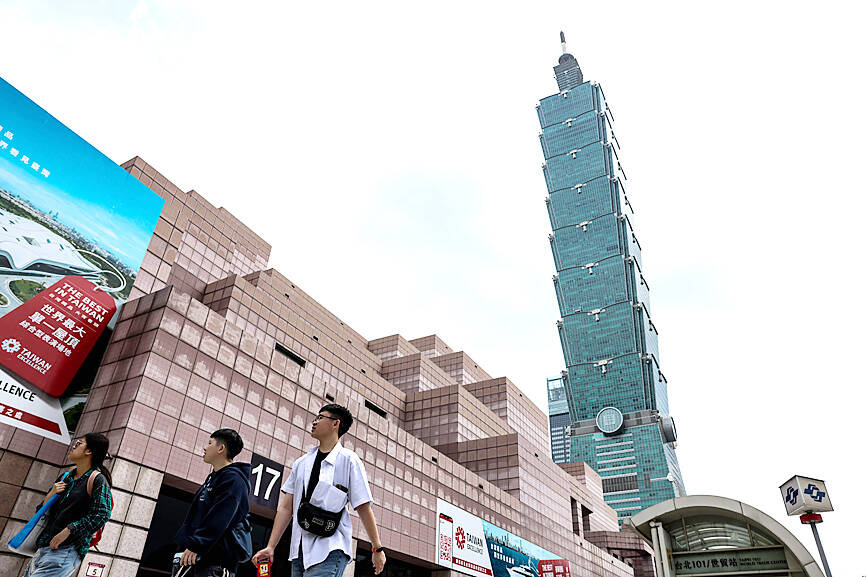S&P Global Ratings yesterday reaffirmed Taiwan’s sovereign credit ratings, maintaining its “AA+” long-term and “A-1+” short-term ratings with a stable outlook.
Taiwan’s “robust net external asset position, sound fiscal settings and monetary flexibility” continue to support its creditworthiness despite mounting economic headwinds from a weakening global trade environment, S&P said in a statement.
While geopolitical tensions remain a source of pressure on the nation’s ratings, "they are unlikely to derail long-term growth in its highly competitive manufacturing sector," the agency said.

Photo: Cheng I-hwa, AFP
In addition, Taiwan’s advantages, such as its leading position in advanced chip manufacturing, sound fiscal position and strong net external assets, provide it with sufficient buffers to mitigate the impact of US tariffs on the economy, it said.
The agency’s latest assessment comes amid renewed concerns over global trade tensions, as US President Donald Trump’s tariff policy raises the risk of a broader trade war among major economies and casts a cloud on the prospects of global economic growth.
Economists said that Taiwan’s solid current account surplus and ample foreign exchange reserves, as well as its technology prowess and the central bank’s monetary flexibility, have prevented the nation from the negative impacts of capital outflows and external shocks.
S&P praised the central bank’s sound monetary management in ensuring ample liquidity in the domestic financial system and maintaining inflation at one of the lowest levels in Asia.
The agency also highlighted the relatively flexible exchange rate of the New Taiwan dollar and the smooth functioning of foreign exchange markets under the central bank’s stewardship, both of which help cushion economic and financial disturbances, the agency said.
As of the end of last month, Taiwan’s foreign exchange reserves stood at US$578.02 billion, up US$438 million from the previous month, while its current account surplus reached US$34.40 billion in the fourth quarter of last year, the central bank’s latest statistics showed.
S&P has maintained its “AA+” long-term and “A-1+” short-term sovereign credit ratings for Taiwan since 2022.

DIVIDED VIEWS: Although the Fed agreed on holding rates steady, some officials see no rate cuts for this year, while 10 policymakers foresee two or more cuts There are a lot of unknowns about the outlook for the economy and interest rates, but US Federal Reserve Chair Jerome Powell signaled at least one thing seems certain: Higher prices are coming. Fed policymakers voted unanimously to hold interest rates steady at a range of 4.25 percent to 4.50 percent for a fourth straight meeting on Wednesday, as they await clarity on whether tariffs would leave a one-time or more lasting mark on inflation. Powell said it is still unclear how much of the bill would fall on the shoulders of consumers, but he expects to learn more about tariffs

Meta Platforms Inc offered US$100 million bonuses to OpenAI employees in an unsuccessful bid to poach the ChatGPT maker’s talent and strengthen its own generative artificial intelligence (AI) teams, OpenAI CEO Sam Altman has said. Facebook’s parent company — a competitor of OpenAI — also offered “giant” annual salaries exceeding US$100 million to OpenAI staffers, Altman said in an interview on the Uncapped with Jack Altman podcast released on Tuesday. “It is crazy,” Sam Altman told his brother Jack in the interview. “I’m really happy that at least so far none of our best people have decided to take them

PLANS: MSI is also planning to upgrade its service center in the Netherlands Micro-Star International Co (MSI, 微星) yesterday said it plans to set up a server assembly line at its Poland service center this year at the earliest. The computer and peripherals manufacturer expects that the new server assembly line would shorten transportation times in shipments to European countries, a company spokesperson told the Taipei Times by telephone. MSI manufactures motherboards, graphics cards, notebook computers, servers, optical storage devices and communication devices. The company operates plants in Taiwan and China, and runs a global network of service centers. The company is also considering upgrading its service center in the Netherlands into a

NOT JUSTIFIED: The bank’s governor said there would only be a rate cut if inflation falls below 1.5% and economic conditions deteriorate, which have not been detected The central bank yesterday kept its key interest rates unchanged for a fifth consecutive quarter, aligning with market expectations, while slightly lowering its inflation outlook amid signs of cooling price pressures. The move came after the US Federal Reserve held rates steady overnight, despite pressure from US President Donald Trump to cut borrowing costs. Central bank board members unanimously voted to maintain the discount rate at 2 percent, the secured loan rate at 2.375 percent and the overnight lending rate at 4.25 percent. “We consider the policy decision appropriate, although it suggests tightening leaning after factoring in slackening inflation and stable GDP growth,”